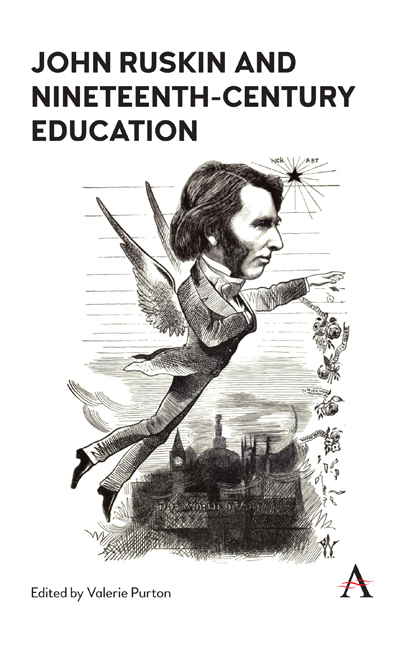Book contents
- Frontmatter
- Contents
- List of Figures
- Foreword
- Introduction
- Section A Changing the World
- Chapter 1 ‘An Enormous Difference between Knowledge and Education’: What Ruskin Can Teach Us
- Chapter 2 ‘Souls of Good Quality’: Ruskin, Tolstoy and Education
- Chapter 3 ‘To Teach Them How to Dress’: Ruskin, Clothing and Lessons in Society
- Chapter 4 Mad Governess or Wise Counsellor? Sesame and Lilies Revisited
- Section B Libraries and the Arts
- Section C Christianity and Apocalypse
- Notes on Contributors
- Index
Chapter 1 - ‘An Enormous Difference between Knowledge and Education’: What Ruskin Can Teach Us
from Section A - Changing the World
Published online by Cambridge University Press: 25 July 2018
- Frontmatter
- Contents
- List of Figures
- Foreword
- Introduction
- Section A Changing the World
- Chapter 1 ‘An Enormous Difference between Knowledge and Education’: What Ruskin Can Teach Us
- Chapter 2 ‘Souls of Good Quality’: Ruskin, Tolstoy and Education
- Chapter 3 ‘To Teach Them How to Dress’: Ruskin, Clothing and Lessons in Society
- Chapter 4 Mad Governess or Wise Counsellor? Sesame and Lilies Revisited
- Section B Libraries and the Arts
- Section C Christianity and Apocalypse
- Notes on Contributors
- Index
Summary
John Ruskin was above all a teacher. In addition to being the first Slade Professor of Art at Oxford, he gave art instruction at the Working Men's College in Red Lion Square; taught drawing by correspondence; and made his teaching more widely available through public lectures and his published books. Unusually for the period, he also showed a great interest in women's education and gave generously of his time and resources to a number of girls’ schools and teacher- training colleges, including Felsted House, Oxford, the girls’ high school in Cork, Somerville College, Oxford, Girton and Newnham Colleges, Cambridge and Whitelands Training College.
Dinah Birch has written of Ruskin's belief that ‘The authority of the past could challenge the complacency of the present, providing models for alternative ideas and practices.’ Ruskin repeatedly looked to the practices and examples of the past, but not in a naively nostalgic way. As Stuart Eagles observes, ‘Ruskin understood that you could not recreate the past, because you could not recreate the conditions and circumstances prevailing in the past [.…] The lessons of the past, however, could be learned.’
Ruskin was also keenly aware of the interdependence of all things, a principle that he called the ‘Law of Help’. ‘The system of the world is entirely one’, he maintained. ‘Small things and great are alike part of one mighty whole.’ This was as true of education as of art, nature or society; not only are the various branches of knowledge interrelated, he argued, but the wisest minds of the past commune with the present through their teachings. For Ruskin, these teachings are vital truths; they have helped to make us who we are and have the potential to guide us in shaping the future. ‘The right fulfilment of national power in art’, Ruskin wrote, ‘depends always on the direction of its aim by the experience of ages’. True education, he believed, must be similarly guided. Proust observed in the preface to his translation of Ruskin's Bible of Amiens that
Ruskin lives in a sort of fraternal society with all the great minds of all times, and since he is interested in them only so far as they can answer eternal questions, there are for him neither ancients nor moderns, and he can speak of Herodotus as he would of a contemporary.
- Type
- Chapter
- Information
- John Ruskin and Nineteenth-Century Education , pp. 13 - 30Publisher: Anthem PressPrint publication year: 2018

